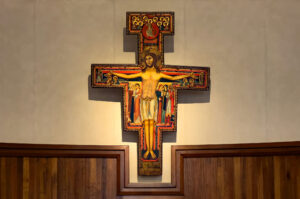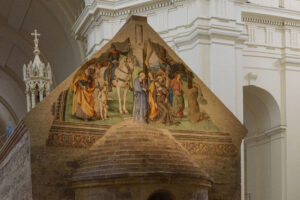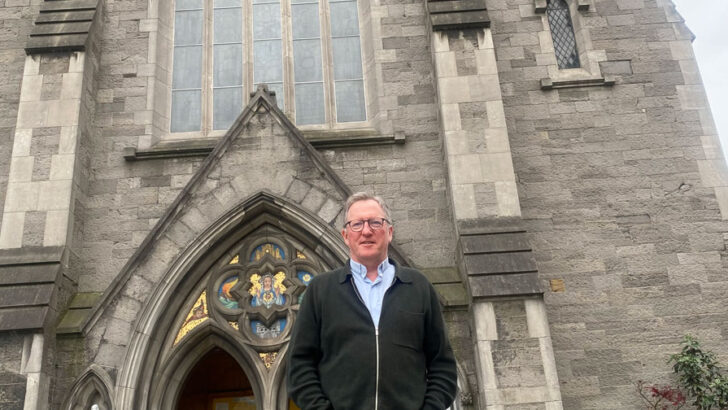“Francis, Francis, go and repair My house which, as you can see, is falling into ruins”.
These words of Christ, spoken from a cross in the little church of San Damiano to St Francis of Assisi, crept into my mind when I took an old wooden pew in the little church of the Immaculate Heart of Mary on Dublin’s City Quay, a short stroll from O’Connell Bridge.
It was the Feast of All Saints and as Taizé music gently nudged us towards the 8am Mass, I was utterly distracted by the sheer extent of paintwork coming off all the walls, dull pastel colours tired and defeated, ripped and torn, rippled like faint watercolour waves along the walls that refused plaster in protest at their neglect. The altar area looked cheap and dated, like something that came flat packed for a pop-up church at a music festival.

Repair
“Francis, go and repair…”.
St Francis restored several rural churches around Assisi, the most famous being the Portiuncula (meaning little portion), the little chapel of St Mary of the Angels, just outside the town of Assisi. It became the cradle of the Franciscan movement and Francis lived and died there.
‘City Quay’ as it is known, is also on a ‘little portion’ of land, squeezed in by large modern office blocks that block its light, and ugly development sites on the other. It was once a church for dockers and their working class families, many now long gone out to the suburbs but a community still exists, perhaps persists, despite efforts to shove them out.
When St Francis’s father, a very successful businessman, demanded his errant son give him back all that he had given and invested in him, his son, Francis stripped naked before the bishop, his father and the town and declared he would serve God only now.(Hard not to have some sympathy for the father of a stubborn son).
Man cannot serve two masters. Francis chose his. “Repair my House.”
A little bell rings and Fr Alan Hilliard, administrator of this little underdog, emerges to begin the Mass.
An apology – the large radiators aren’t working this morning because of a ‘glitch’. The mix of Irish and foreign worshippers that make up the 30 to 40 strong early morning congregation don’t seem to mind or are used to this at ‘St Mary of the Glitches and Peeling Walls’.
It seems right for this little diverse gathering of office workers, immigrants, lost souls, even stray journalists that at least, here amid the frontier poverty they have the promise of Heaven”

It feels and looks like a frontier Church, in the heart of inner city Dublin with its homelessness, sense of danger, lingering intergenerational poverty, flanked by immense wealth, disdain and indifference, yes this is a frontier alright. “Repair My house…”.
The pews are littered with copper plates with dedications and remembrances for parishioners long gone, this is a sacred space with a lot of history. Afterwards Fr Hilliard tells me it was built by a priest, mostly out of his own pocket (his family had a few bob) for the poor people of the area, as Westland Row church was seen back then as upmarket and unwelcoming. I wonder how they would react if they knew Westland Row was now becoming a Basilica and across the river the Pro-Cathedral was being elevated to a full Cathedral. The plaques with the names of dead parishioners are still and silent, just the paint and plaster keeps peeling, unwilling to stay still in its protest.
Blessed
“Blessed are the poor in spirit, for theirs is the kingdom of Heaven”-the Gospel is on the Beatitudes for the Feast day. It seems right for this little diverse gathering of office workers, immigrants, lost souls, even stray journalists that at least, here amid the frontier poverty they have the promise of Heaven.
The priest gives a homily, he quotes the Jesuit theologian Karl Rahner –(the Church might be falling down but theological standards are being kept up) – “The Feast of All Saints strengthens and encourages us to create that path by walking it.”
In other words -‘walk the walk, don’t just talk the talk’. The saints, says the priest, are among us and are walking the walk.
A local lady with a kind face approaches the priest at the back door and says to a few of us gathered: ‘He’s a saint’
At the sign of peace, we all turn to each other and nod, or gently bow, you never know there might be a saint or two here. As signs of peace go, it’s silent, reverential and respectful of each other; we’re in this together.
As Mass concludes Fr Alan announces that he’ll be away on business for a few weeks but a Jesuit will be filling in, “to protect the congregation from heresy” he quips.
He adds that because it’s a feast day Mass, normally they would have two collections but he understands people are rushing off to work so the collection basket is at the back- “and we will still let you out if you haven’t got change.” Nothing is asked in this church but everything is given, poured out till the cup overflows. The congregation know it.
A local lady with a kind face approaches the priest at the back door and says to a few of us gathered: “He’s a saint”.
When God called Francis he drew him to a tiny dilapidated old church and said ‘go and repair My house which, as you can see, is falling into ruins”. The little spaces, among the meek and poor, the glitches and the peeling walls, encircled by high rise office blocks blocking out the light, forgotten by the great Basilicas and Cathedrals, these are the places that God chooses to speak, and make his will known.


 Fr Alan Hilliard outside City Quay church on the Feast of All Saints
Fr Alan Hilliard outside City Quay church on the Feast of All Saints 